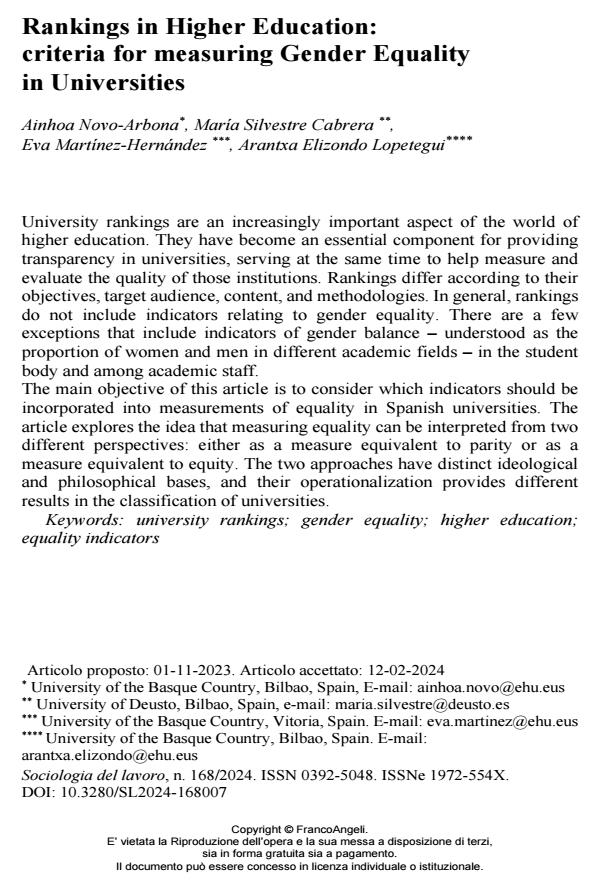Rankings in Higher Education: criteria for measuring Gender Equality in Universities
Titolo Rivista SOCIOLOGIA DEL LAVORO
Autori/Curatori Ainhoa Novo-Arbona, María Silvestre Cabrera, Eva Martínez-Hernández, Arantxa Elizondo Lopetegui
Anno di pubblicazione 2024 Fascicolo 2024/168
Lingua Inglese Numero pagine 22 P. 131-152 Dimensione file 212 KB
DOI 10.3280/SL2024-168007
Il DOI è il codice a barre della proprietà intellettuale: per saperne di più
clicca qui
Qui sotto puoi vedere in anteprima la prima pagina di questo articolo.
Se questo articolo ti interessa, lo puoi acquistare (e scaricare in formato pdf) seguendo le facili indicazioni per acquistare il download credit. Acquista Download Credits per scaricare questo Articolo in formato PDF

FrancoAngeli è membro della Publishers International Linking Association, Inc (PILA), associazione indipendente e non profit per facilitare (attraverso i servizi tecnologici implementati da CrossRef.org) l’accesso degli studiosi ai contenuti digitali nelle pubblicazioni professionali e scientifiche.
University rankings are an increasingly important aspect of the world of higher education. They have become an essential component for providing transparency in universities, serving at the same time to help measure and evaluate the quality of those institutions. Rankings differ according to their objectives, target audience, content, and methodologies. In general, rankings do not include indicators relating to gender equality. There are a few exceptions that include indicators of gender balance – understood as the proportion of women and men in different academic fields – in the student body and among academic staff. The main objective of this article is to consider which indicators should be incorporated into measurements of equality in Spanish universities. The article explores the idea that measuring equality can be interpreted from two different perspectives: either as a measure equivalent to parity or as a measure equivalent to equity. The two approaches have distinct ideological and philosophical bases, and their operationalization provides different results in the classification of universities.
Parole chiave:university rankings; gender equality; higher education; equality indicators
Ainhoa Novo-Arbona, María Silvestre Cabrera, Eva Martínez-Hernández, Arantxa Elizondo Lopetegui, Rankings in Higher Education: criteria for measuring Gender Equality in Universities in "SOCIOLOGIA DEL LAVORO " 168/2024, pp 131-152, DOI: 10.3280/SL2024-168007